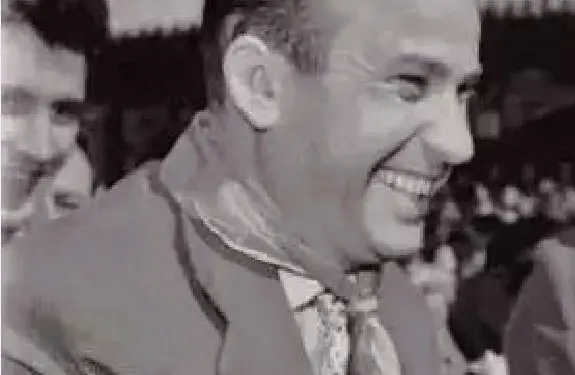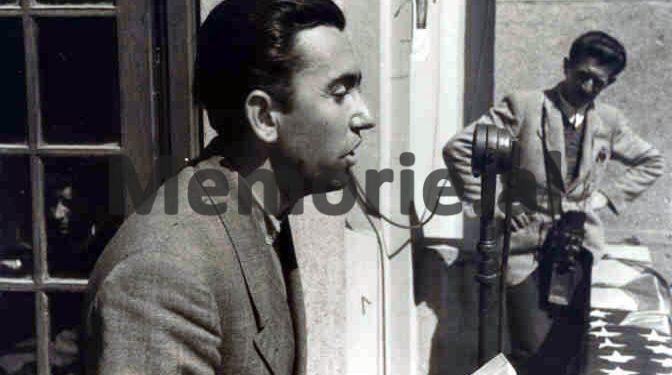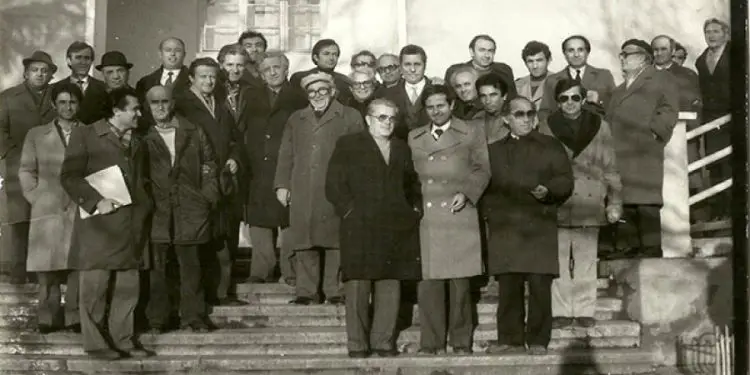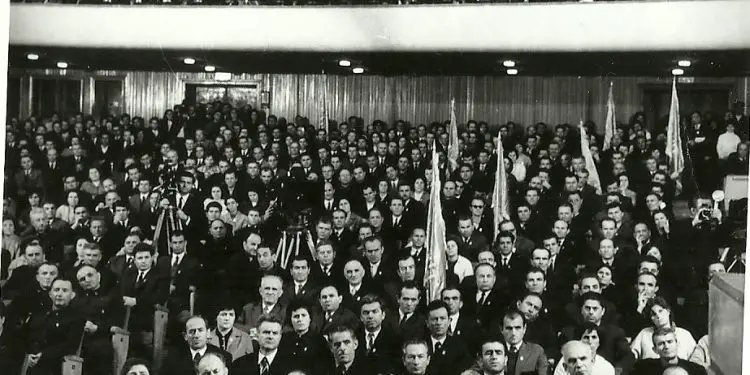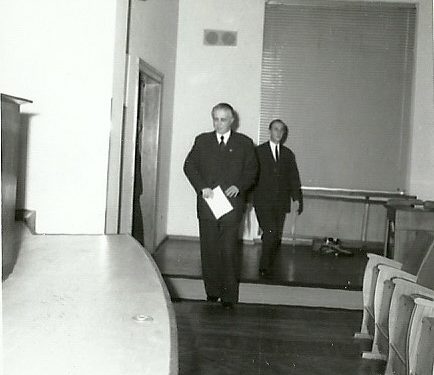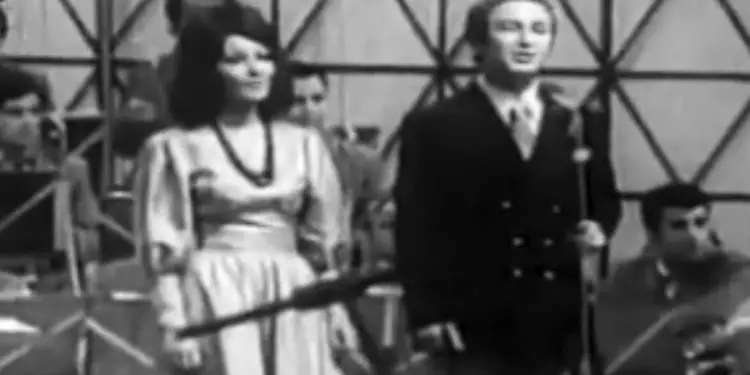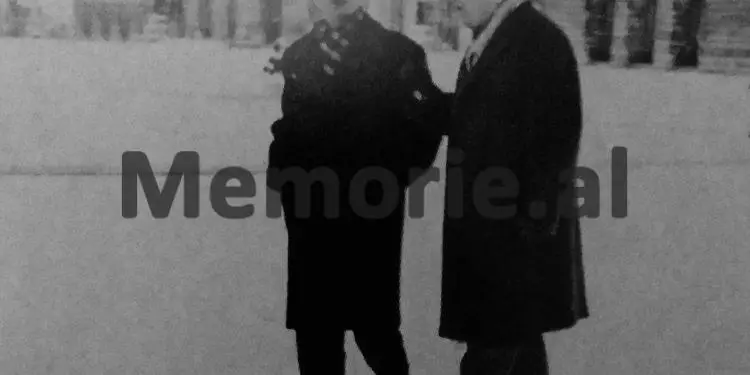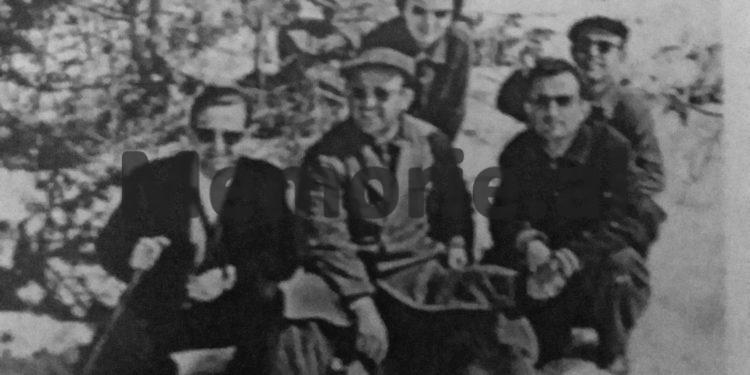Dashnor Kaloçi
The fifth part
Memorie.al publishes some archival documents extracted from the Central State Archive in Tirana (fund of the former Central Committee of the ALP), which belong to June 1973, when the IV Plenum of the Committee was held in Tirana Central of the ALP, where Enver Hoxha held the main report on “To deepen the ideological struggle against foreign performances and liberal attitudes towards them.” The unknown speech of Enver Hoxha, which was held mainly only for art and culture and became the “guillotine” of writers and artists, as there were “cut off many heads” of them, being initially fired from the duties and functions they had had until then, to be completed later in the most remote villages of Albania, in mines and construction sites, as well as prisons and internments of the communist regime of Enver Hoxha, such as: Fadil Paçrami, Todi Lubonja, Mihallaq Luarasi, Lluk Kaçaj, Sherif Merdani, Minush Jero, Kujtim Spahivogli, Ibrahim Uruçi, Dhimitër Shuteriqi, Edi Luarasi, Zhani Ciko, Leka Bungo, Bujar Kapexhiu, Novruz Yzeiri, Dorjan Nini, Francesk Radi, Justina Aliaj, Vilson Kilica, Hamide Stringa, etc.
“Phenomena of this nature have been observed in light music, especially in rhythmic music, where there have been deformations of the clear melodic line and the way has been opened to unbridled rhythms. This was especially evident at the 11th Radio-Television Song Festival. Our whole social opinion indignantly rejected that vulgar music, those despised songs and that snobbish performance that this festival brought us on stage. He rightly considers and condemns it as an insult to the best national tradition, popular spirit and partisanship of our art. Such foreign performances have also appeared in some paintings, in the stage presentation of a theatrical and operatic work, on the covers of books, etc. Such deviations have directly affected both the form and the interior of our literature and art. These perverse tendencies are at odds with the partisanship of literature and art, with their formative and educational role, with their popular and national character. “They put a barrier between art and the people, fade the democratic nature that our art should have, spoil the tastes of the working masses.”
This is what Enver Hoxha said, among other things, in his speech held at the IV Plenum of the Central Committee of the ALP, which took place on June 26 and 27, 1973, which was held mainly only for the art of culture and became the “guillotine” of writers and artists, as it “cut off many heads” of them, initially dismissing them from the tasks and functions they had held until then, to then end up in the most remote villages of Albania, in mines and construction sites, as well as prisons and internments of the communist regime of Enver Hoxha, such as: Fadil Paçrami, Todi Lubonja, Mihallaq Luarasi, Lluk Kaçaj, Sherif Merdani, Minush Jero, Ibrahim Uruçi, Dhimitër Shuteriqi, Edi Luarasi, Zhani Ciko, Leka Bungo, Bujar Kapexhiu, Novruz Yzeiri, Dorjan Nini, Francesk Radi, Justina Aliaj, Vilson Kilica, Hamide Stringa, etc., where most of them were released from prison or returned to Tirana only after the fall of the regime communist in the early 1990s.
For more than what was said by Enver Hoxha in the IV Plenum of the Central Committee of the ALP, we know the archival document that Memorie.al is publishing for the first time in several parts (with some abbreviations), starting from today’s writing.
Followed by the last number
Speech of Enver Hoxha at the IV Plenum of the Central Committee of the ALP, held in Tirana on 26 and 27 June 1973
From the beginning of this discussion I pointed out that in the written self-criticism of Fadil Paçrami, the role and the Party in the leadership do not appear anywhere, nowhere is it mentioned for good, except “for the mistakes it has made”. According to him, in no case does it turn out that the Party line has inspired him: the party has led him to work. Then the question arises: Where did this man graze and where does he graze? Let him speak with his mouth and he spoke here too, but I am reading to you point by point, without changing any comma of his creed that appears in the first paragraph of pages 5-6 of his self-criticism. Listen to friends: “I have thought and I think that in order to have a fair and better development of literature and arts, some phenomena such as: sentimentality, naturalism, schematism, etc. must be overcome, we must also get rid of each and finally from any the influence of a kind of clerical literary current that existed before the liberation with its favorite themes on the exotic, the preservation of patriarchal customs, the departure from social problems and the deification of some superclass virtues, accompanied by not at all essential ways of speaking and appearance; a determined struggle had to be waged to eradicate foreign concepts and views under the influence of decadent bourgeois and revisionist currents, in the content and means of expression that sow pessimism, fatality, the futility of life and the impossibility of transforming the world; those confusing schemes of Soviet school literature and art that were unable to stand in the way, but rather paved the way for revisionism in the Soviet Union and elsewhere, had to be overcome. And I struggled with all these directions. But where does the error lie? These issues have not been made clear to a wide range of writers and artists, and this speaks to the poor work of the Party in the district, of the grassroots organizations in the cultural and artistic institutions, and of myself, who directs these sectors. Likewise, I could not always create normal relations between all creators, to create the so-called artistic environment, but it happened that for some of them, in whose works there were influences and performances of different types, were used expressions such as naturalist, schematic, conservative, modernist, etc. My reaction here has not been such as to cut the path to such things. After the criticism made in the 15th Plenum of the Central Committee of the Party against some works with foreign bourgeois and revisionist influences, there was a better work and the results in literary and artistic creativity were greater; “But this underestimated the risk of foreign influences, and I did not draw the attention of the grassroots organizations to this, so as not to forget this risk, it seems that I also underestimated it, which led to the fall back into such mistakes.”
As we are seeing, this “great theorist”, this boss over the Party, outside the sphere and influence of the Party, who neither hears nor confuses the Party, “has thought and thought” and “gives the line” and for this “his line”. The party in the district has worked poorly, grassroots organizations and institutions as well. The chief “could not always create normal relations between all creators, to create the so-called artistic environment, etc.” All of us who have fought against the anti-party elements are reminded of the “Theory of the party chief”, of Sejfulla Malëshova, Koçi Xoxa and others, in the Berat Plenum, with which they hit the line of the Party and its leadership. This phenomenon is similar to Fadil Paçrami and here is the goal. We remember the arrogance and arrogance of Sejfulla Malëshova. We find these anti-party features in Fadil Paçrami. “I have called myself with formed concepts, this is true”, says Fadil Paçrami in his self-criticism. And we tell him that we believe him, that what he was thinking, his concepts were formed. Fadil Paçrami’s concepts were not only liberal and modernist, but they were rather anti-party and revisionist concepts in ideology, politics, culture and art, organizational issues and practical activity.
The concepts formed also had certain objectives. For the revisionists Fadil Paçrami and Todi Lubonja, the Albanian Labor Party was a bureaucratized party, a dogmatic, conservative, Stalinist party. Therefore, their megalomaniacal objective was to change her course. Po si? Fighting with the legal mask for line distortion. Their anti-party and anti-proletarian concepts led them to choose the basis for launching their activity in culture and the arts, because they thought lightly from the reactionary that there would be the weak point of the Party favorable to them. They also thought that in their anti-party actions they would find support in the youth, which, according to them, they could put in opposition to the Party. These misconceptions are old. Nako Spiru also expressed these in his time and the Party fought against him. These views not only come as reminiscences of these two people, but are also direct influences of the worst counter-revolutionary work done by the bourgeoisie and the reaction of the youth in the capitalist and revisionist countries. From these positions and from this ground they began to strike the straight line of the Party. “There are no issues here, – says Fadil Paçrami, – issues of new and old generations”.
This is one of the main directions of their war: The rupture of this great unity, seasoned with blood and sweat from generation to generation by our people against its external and internal enemies, which crowned our heroic Party with the War National Liberation, with the popular revolution, with the construction of socialism, with the continuous revolutionization of the life of the country and the people, in the war with the micro-bourgeois, revisionist, capitalist influences. It is not, as these anti-party elements want to disguise themselves, that they allegedly inadvertently erred against some writers or artists of pre-1960 times. No, that is a lie. These elements have been against the glorious past of our people, against its ardent patriotism of every period of history, they denied and hated the ancient culture of our people, the wonderful progressive customs and habits, they denied and hated the songs, the music, his folklore, call these “gangrenes” of music they wanted to restore in our socialist homeland. These were the most degenerate cosmopolitan.
People say in organizations: “Fadil Paçrami, said: we are with Skënderbeu to the throat”. Some friends who discussed brought here other facts in this regard. He did not like the dramas about Bajram Curri, “Fisheku në pajë” and many others, which he contemptuously qualified as “Bogdani Theater”. For Fadil Paçrami and for some servile director, who called Fadil “the greatest playwright Albania has ever seen”, only the drama “House on the Boulevard” was valuable, where it is about a girl who becomes pregnant, or another drama “A events in the factory ”, where the journalist, as in the West, becomes the judge of the Party line and the people and the Party is not put in its place of leader, educator and advisor. According to Fadil Paçrami and others, they were the ones who were creating the truly “modern” theater in every sense of the word. But let us set aside his dramas of no value and look at the problems further. How right has been the line of our Party in preserving the great wealth of the people and the homeland, of that great spiritual wealth that has kept our nation alive, in storms and tempests. How rightly the Party and the people of our art and popular culture have fought to cleanse the thorns that drowned this flourishing garden and brought it to light and at its base, following the beautiful tradition, created its natural continuation, the culture of a socialist country, firmly rooted in the land and the national fountain, preserved its beautiful forms and embellished its content, gave it socialist, revolutionary content.
They developed this revolutionary content, because this revolutionary content did not fall from the sky, nor was it brought to us with suitcases from outside, but we inherited it from our ancestors. Leninism and our Party teach us to rely strongly here, because here revolution and socialism are based, in the people, in the working class. We are Marxists and we see development through the prism of historical materialism. The Party, the class, the people, the youth, the woman, the army, the writers, the artists, the teachers and the professors, in a steely unity around the Party and under its leadership, built it with blood, sweat, toil and sacrifice, between an indescribable and never-ending enthusiasm, this beautiful building, while some revisionist garbage manages to preach to us to abandon the past, we must blow up the foundations, because it is anachronistic to us, it is conservative, the youth does not love it. “I no longer have to write and create works that excite me, I have to throw away everything that arouses patriotic emotions or feelings, modernity does not tolerate these”, say these trashes and “moderns are us, we are the vanguard” of him the revolution preached by the revisionist and capitalist-Trotskyist garbage of Moscow, the streets of Paris, Bonn, Rome and Belgrade.
Fadil Paçrami in his so-called self-criticism – says “let’s stop for a moment on the issue of the ’60s and beyond” and seeks to explain how this “great revolutionary” participated “more” in the struggle for revolutionization and especially of literature and the arts. It resembles the tale of the fly and the oxen pulling the loaded cart on an uphill road. Raising everything to a higher level, as well as in literature and the arts, are the work of the Party and the workers and not of those who make noise like flies, who sting and sabotage. In every period of our lives there have been ups and downs, there has been progress, there has been progress. This is the revolutionary feature of all our development. Revolutionary and creative elders are happy and this is their goal in life, to serve with all their might the homeland of the people and to help, encourage and encourage the younger generation to affirm, create, take the baton, to continue and develop the most brilliant revolutionary tradition. Why is Fadil Paçrami trying to explain to us the period after the ‘60s that is clear to us and to everyone? Or why after ’60 he started writing “his famous plays”? Lies!
It is known historically that 1960 was the beginning of the open heroic frontal war of our Party against modern Soviet and world revisionism, was the life or death struggle of the Party and our brave people against the revisionist-capitalist blockade. This is where your start begins, Fadil Paçrami and Todi Lubonja, but not in the revolutionary way of the Party, but in the anti-revolutionary, anti-party, revisionist way. The facts show this. You in vain want to lose the traces of the mangy goats in this great revolutionary sea that has erupted in our country; you cannot identify with our heroic youth who despise you, why with your views and actions you tried to degenerate it morally, ideologically and physically. You cannot identify with the large and steep units of talented writers, poets, composers, singers and popular folk artists, old and young, why they hate you and your friends like you, worthless, intriguers, troublemakers, political thugs, supporters of the decadent bourgeois-revisionist currents in literature and art and sworn enemies of our art of socialist realism.
They have never loved you, why have you been two-faced, arrogant, imposed on some under the guise of Party authority and they have endured you for a while, some have threatened you with this authority and this forms guilt and crime against the Party, some others were wrong, why were they naive, politically unprofessional, unable to discern your revisionist tricks. You gathered around you some servile, some degenerate, for whom Fadil Paçrami regrets that he took them in his arms, when in fact they were looking for Fadil and Todi, and they were looking for such people, that it was just a dough such could cook such moldy bread. The Party struggle, her upbringing and the patience she has consistently shown for her member, Todi Lubonja, did not affect him. Todi Lubonja remained a micro-bourgeois with all the petty characteristics of people of this origin, from the humility and struggle and efforts he made to gain favors and comfortable positions to arrogance and megalomania for his “great values”. For him, as for Fadil Paçrami, the Party line and the horizons it opened were narrow.
For their “big minds” other perspectives had to be opened “liberal, broad, endless, liberal, modernist” in everything. When the Party sent him to work outside Tirana, Todi Lubonja did not go without showing dissatisfaction beforehand, without looking for popular places. And it must be said that he has never been wronged in the slightest. It must also be said that this was the exception of all the other comrades of the leadership, who have gone at every moment with enthusiasm where the work of the Party loved them. Everywhere he started from work, from the first day the first step that Todi Lubonja would take was the overthrow, the “reform”, as he called them in the modernist way, as he tried to do in the “Voice of the People”. Todi Lubonja who trumpeted himself “supporters of the new”, the fight against conservatism, the fight against slavery. of women from backward customs and canons, etc., as well as directive speeches on these issues, being the editor-in-chief of “Voice of the People”, he left them in oblivion. We have severely criticized him for these attitudes, but the course of time showed that he did not agree with the Party line.
The same thing was done by Todi Lubonja in Korça, where he gathered people declassed in art, like a certain Minush Jero and Mihallaq Luarasi. He crowned the latter on Radio-Television, where he “cleansed”, brought degenerate people, removed the grassroots organization, regulated and manipulated programs, in which jazz, love songs, decadent forms and ways of art began to dominate. western bourgeois. He went so far as to consider Radio-Television as his domain, the field of action of his revisionist ideas, and with arrogant contempt received neither remarks nor criticism. Above all, this empty man with no value, hiding under the guise of a leader and as a former youth leader, was removed from us as if he were an authority in matter, as if he embodied the desires and aspirations of the youth. Such is the consideration of Todi Lubonja for the Party, for its line, for the Central Committee of the Party, that his self-criticism in the basic organization was not good at all, and it did not even occur to him to address a self-criticism to the Committee Central, where to analyze his grave faults. You heard the false self-criticism he made here, in a pompous tone, but which became dust and ashes from the heated discussions of the members of the Central Committee Plenum.
As can be seen, Todi and Fadil have been on an anti-party path, have had the same goals, had the same thoughts and used the same working methods. But no, Fadil Paçrami and Todi Lubonja, you could not continue your anti-party, revisionist work. This would end without glory for you. Why did it continue and so, the Party can rightly say, why were no measures taken against you before? The party has the right to criticize us, who were more patient than we should have been with you, who, by constantly pointing out your mistakes, went in the hope that you would be corrected, exaggerated with advice before your stubbornness to walk from error to error. But we tell the Party that we have not allowed them to graze as they please. In each of their activities they waited for the ambushes of the Party. It is true that sometimes the grassroots organizations were found by surprise, where they and some of their people acted contrary to the Party line. Fadil and Todi have used both deception and denial, as real political thunderbolts, to put to sleep for a while some grassroots organizations and some collectives, even the Tirana District Party Committee. But the trick has come to the fore, the lie always has short legs.
Behold, you went through all the corners of the Party and got here, to its highest instance, to the Central Committee, which judged your activity. What did the Party say about you? He unanimously condemned you, with full conscience and purity, on the basis of the facts proving your activity. You were judged fairly, realistically and fairly by the working masses. The Party has considered your past, it has always rightly valued you and conscientiously gave you its hand, it and its leadership have tried to correct you, but you did not want to, you have despised the Party, the leadership and their help. You thought you were “great people”, “untouchable people”, “leaders of a new future Albania and another party”, that you dreamed of. Even now, before this just trial and the deserved punishments we inflict on our hostile actions, you say to yourself “nothing, we are again the prominent people of a future, the West will speak for us, it will “Belgrade will speak, Moscow will speak”, as he talks about Liri Belishova and other trash.
This is true, why you are theirs, ideologically and politically, while for our Party you are conspirators and, thinking that our country and the Party were in crisis because of the capitalist-revisionist siege, you activated your hostile actions. Tomorrow you thought you would come out as lifeguards. You, like the anti-party elements I mentioned at the beginning, did not disguise yourself with left-wing slogans, but judged that international circumstances required you to work and come out with right-wing slogans. Party vigilance shattered your plans and dreams. But we tell you that you are rags, you are nothing, you are and you will be political and ideological corpses without the slightest value. We advise you to deeply recognize your big and dangerous mistakes. You have to clear your head and conscience of many bad things that have taken root in you, lower your head at work and at work cleanse yourself, become new people. Sick dreams do not cure man, on the contrary they make him sick more. We tell you that your convalescence will be long, you must help yourself to the Party help you.
This has not failed to help you and do not forget that you have despised and kicked her help. The Party has never been and will never be vindictive against those who err, even gravely, as you erred, but know that the Party is not in the habit of rubbing your arms, it will hit you even harder, in case that you will continue in your mistakes. Considering the serious mistakes in the Party line of Fadil Paçrami and Todi Lubonja; Considering that their numerous errors were fully substantiated by facts in open and grounded discussions by the whole Party, from the grassroots to the Central Committee; Considering that both of them did not appreciate it, on the contrary, they despised the great and continuous help that the Party had given them for a long time, in order to correct their mistakes and correct them; Considering that their anti-party attitudes, both in theory and in practice, have damaged the Party, the state and the construction of socialism, and that for these grave crimes of theirs they both made a very shallow, false and formal self-criticism, I propose , like all of you, that Fadil Paçrami and Todi Lubonja be expelled from the Party as its members, be expelled from the Central Committee as members of this high leadership forum of the Party, be also expelled from all other leading functions in dewletl.
Agim Mero made self-criticism for his serious mistakes. We rejoice when a friend sincerely recognizes the mistakes, even if they are serious, because that way there are guarantees for the Party that he will correct them. The party and its leadership helped him and will help him move towards the future, not forgetting the right principle that self-criticism is never enough, be it and very good, if at work, in war, in life, is not proved by deeds, actions, attitudes. In light of the mistakes of Agim Meros, I propose to the Plenum that, for his mistakes, Agim Meros be given as a punishment: to be reduced from a member to a candidate of the Plenum of the Central Committee. In addition, we will consider some of the proposals that were made here regarding its current state functions. The proposal was put to the vote and approved unanimously. Then, comrades, with that we are done, I wish your health and good work for the triumph of the Party ideas! Long live the Party! /Memorie.al




